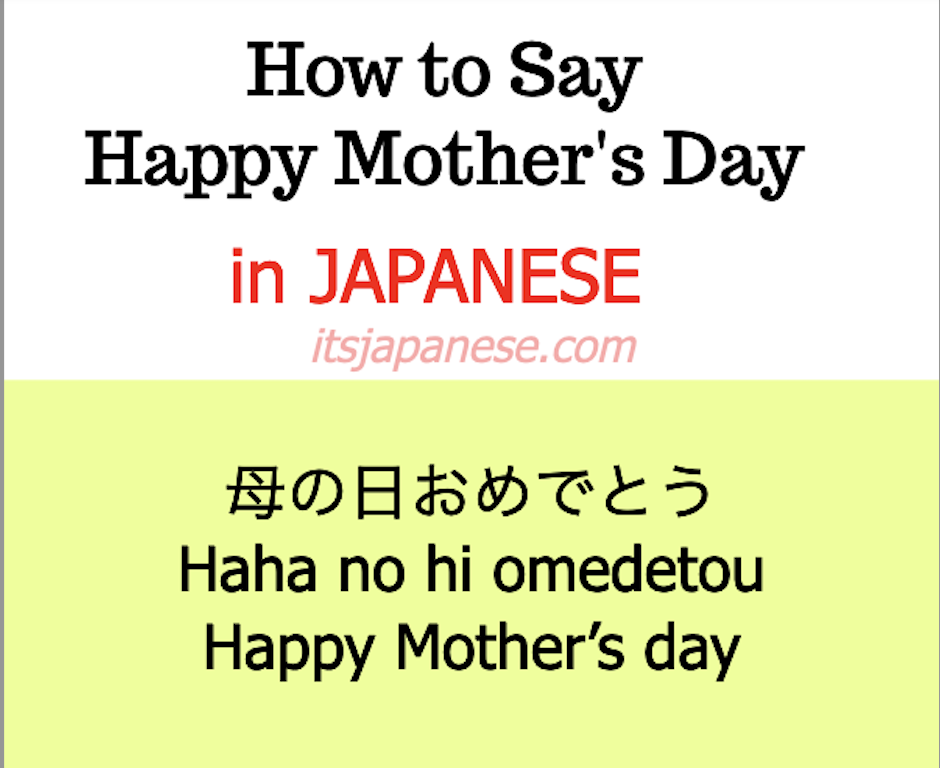Want to say Happy Mother’s Day in Japanese?
This guide will teach you 14+ natural phrases that you can use on Mother’s Day.
So, if you’re learning a bit of Japanese…
…or if you just want a quick phrase to grab, keep on reading.


#1. 母の日おめでとう
Haha no hi omedetou
Happy Mother’s day
This is the most common way to say Happy Mothers day in Japanese.
It is a phrase that can be seen on Mother’s Day cards or any signs in public places. It might be a little bit awkward to tell this to your mother in person. I would not recommend saying it to your mother, but it is good to know that this is what is used to say, “Happy Mother’s Day!”
#2. お母さんへ・大好きなお母さんへ
Okāsan e ・Daisukina okāsan e
To my mother / To the mother I love so much
The use of the word, ‘e’ makes this a phrase that you would use at the beginning of a message to your mother. Both ways are correct, but if you would like to add in a bit more emotion, expressing your love for your mother, you would choose the latter option!
#3. いつもありがとう(ございます)
Itsumo arigatou ( gozaimasu )
Thank you always
This is a more indirect way to say Happy Mothers Day in Japanese…
…or at any other occasion.
Yes, this is phrase that can be in daily life or simply when you want to express your gratitude for someone. So, it is not restricted to just Mother’s Day. The use of the word ‘itsumo’ which means ‘always’, insinuates the gratitude you have and have been having since the start.
#4. 普段は恥ずかしくて言えないけれど、、、
普段は恥ずかしくて言えないけれど、、、
Fudan wa hazukashikute ienai keredo
I usually cannot express myself this way because of my shyness…
Thank you always
It is rather uncommon within Japanese culture to be emotionally expressive (even to close family members, including your mother!), which is why phrases like this are commonly used. It is a preface to what the rest of the sentence will be, most likely something emotional.
#5. 本当に感謝しています
本当に感謝しています
Hontouni kansha shiteimasu
I am really grateful
This is another phrase to express general gratitude, and can be used in daily life. The word ‘Hontouni’ means ‘really’, and it adds to the depth of gratitude that you are wanting to express! If you would like to express gratitude towards more specific things, refer to the phrases #5 – #8
#6. 家族を支えてくれてありがとう
家族を支えてくれてありがとう
Kazoku wo sasaete kurete arigatou
Thank you for supporting our family
This is a message / phrase more geared to be said to a mother who is a stay-at-home mother or housewife. It is expressing gratitude for the way your mother has been supporting the entire family from cooking meals to taking care of all the house chores. It is a beautiful message to send to your mother if you would like her to know that you are aware of how essential she is to the family.
#7. 私を産んでくれてありがとう
私を産んでくれてありがとう
Watashi wo unde kurete arigatou
Thank you for giving birth to me
Very simple, straight to the point, and very self-explanatory. A simple thank you to your mother for holding you and birthing you into this world.
#8. 今まで育ててくれてありがとう
今まで育ててくれてありがとう
Imamade sodatete kurete arigatou
Thank you for bringing me up / raising me.
This phrase can be used if you are aware that you will be moving away from your family / your mother. The word “Imamade” means “ up to now”, showing gratitude for the care you have been provided with thus far, and insinuating a change of dynamic that may occur in terms of family life.
#9. いつも美味しいご飯を作ってくれてありがとう
いつも美味しいご飯を作ってくれてありがとう
Itsumo oishii gohan wo tsukutte kurete arigatou
Thank you for always making delicious meals
Although some may find this phrase a little childish, it is a special phrase to share with a mother, again possibly one who has been a stay-at-home mother who has been providing all your meals, school lunches, snacks, etc. Don’t be afraid to share how much you appreciate your mother’s cooking!
#10. いつまでも元気でいてください
いつまでも元気でいてください
Itsumademo genki de ite kudasai
Please stay healthy forever
This may sound like a simple phrase, but it does hold some depth to it. It is a common phrase when wishing someone good health. But at the same time, it is implementing that you would like to spend as much as time as possible with someone who is elder than you in age.
#11. 母の日のプレゼント・花です
母の日のプレゼント・花です
Haha no hi no purezento / hana desu
This is the Mother’s day’s present / flower for you.
This phrase can be said when handing a gift to your mother, or it can be written on a card that is attached to your gift!
#12. また一緒に食事・温泉・旅行にいきましょう
また一緒に食事・温泉・旅行にいきましょう
Mata isshoni shokuji / onsen / ryokou ni ikimasho
Let’s go for meals / to the hot spring / on a trip together again
It is common to use this phrase of “Mata isshoni”, which means “let’s -do this- together again”. It is sharing your intention of carrying out an activity again, since you enjoyed the experience so much the first time.
#13. 今年も母の日にお母さんに感謝できることを幸せに思っています
今年も母の日にお母さんに感謝できることを幸せに思っています
Kotoshi mo haha no hi ni okāsan ni kansha dekiru koto wo shiawase ni omotteimasu
I feel happy that I can be grateful to you again this year
A double meaning within one phrase. Not only do you express your gratitude for your mother on Mother’s Day, but also express the gratitude for being able to have this gratitude for your mother! Gratitude to have another year of Mother’s Day to celebrate!
#14. なかなか会えないけれど、いつもお母さんのことを思っています
なかなか会えないけれど、いつもお母さんのことを思っています
Nakanaka aenai keredo, itsumo okāsan no koto wo omotteimasu
I seldom have a chance to see you in person, but I am always thinking about you
This phrase is perfect for those who are not in close distance to your mother. If you are unable to see your mother as often as you would like, you would use this phrase to express how your mother is always in your thoughts – even if you can’t physically see each other!
Conclusion
So, now you got to learn Japanese...
And, you know how to say Happy Mothers Day in Japanese.
As you can see, most phrases are not very direct and have to more with gratitude, and don’t outright say happy Mothers Day in Japanese. That’s just part of the Japanese language.
Which phrase was your favorite?
Leave a comment!